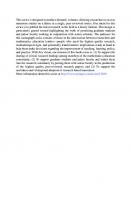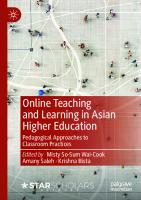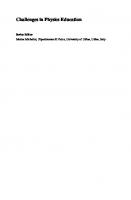Continuous Education in Morocco Pioneering Learning Strategies to Overcome Online Education Challenges
Continuous Education in Morocco Pioneering Learning Strategies to Overcome Online Education Challenges
134 33 525KB
English Pages [13]
Recommend Papers

- Author / Uploaded
- Dr. zeroual khalid
File loading please wait...
Citation preview
Continuous Education in Morocco: Pioneering Learning Strategies to Overcome Online Education Challenges Dr. zeroual khalid 26/11/2023
Université Mohammed V de Rabat Faculté des sciences Continuous education in Morocco stands at the threshold of transformation, embracing dynamic learning strategies to navigate the challenges of online education. This abstract explores innovative approaches aimed at revolutionizing the landscape of lifelong learning. Focusing on the integration of cutting-edge digital platforms, strategic partnerships, and
specialized curricula, the abstract delves into a hypothetical digital skills accelerator program. Designed to address the evolving demands of the job market, this initiative emphasizes accessibility, interactive learning modules, and industryrecognized certifications. Through this exploration, the abstract showcases the potential of pioneering educational endeavors to empower individuals, enhance employability, and propel the nation towards a thriving digital future.
Continuous Education Landscape in Morocco: Challenges and Opportunities" Continuous education in the context of Morocco refers to an ongoing process of learning and skill development that extends beyond formal education and throughout an individual's life. It encompasses various forms of learning, including vocational training, professional development, upskilling, and reskilling, aimed at enhancing knowledge, acquiring new competencies, and adapting to the evolving demands of the contemporary workforce. In Morocco, continuous education holds significant importance in the current job market and societal landscape for several reasons. Continuous education enables individuals to stay abreast of technological advancements, digital innovations, and industry trends, crucial for staying competitive in a rapidly evolving job market. As industries transform and diversify, continuous education ensures that the workforce possesses the
relevant skills and competencies needed to fill emerging job roles and contribute effectively to economic growth. Lifelong learning empowers individuals to progress in their careers, explore new opportunities, and transition between professions or sectors by acquiring additional skills and qualifications. With the changing nature of work, continuous education equips individuals with up-to-date knowledge and versatile skills, enhancing their employability and job security. A workforce committed to continuous learning fosters innovation, entrepreneurial endeavors, and contributes to the overall socioeconomic development of Morocco. Emphasizing continuous education aligns Morocco's workforce with global standards, positioning the country competitively in the international job market. Therefore, within Morocco's contemporary workforce, continuous education serves as a cornerstone for individual growth, economic progress, and national development by ensuring that individuals possess the skills and knowledge necessary to thrive in a rapidly changing world. In Morocco, traditional educational models face several challenges when transitioning to the online sphere, hindering their seamless adaptation to digital formats Disparities exist in internet availability and quality between urban and rural areas, impacting access to online resources for students across the country. Insufficient access to devices like computers, tablets, or smartphones, hindering students' ability to participate effectively in online learning. Limited training and
familiarity among educators with online teaching tools, methodologies, and effective pedagogical strategies in a virtual environment. Challenges in aligning traditional curriculum structures with online learning formats, requiring reconfiguration to suit digital platforms. Socio-economic disparities lead to unequal access to technology and digital resources, exacerbating educational inequality. Affordability issues for both students and institutions, hindering investments in necessary technology and infrastructure. Adapting assessment methods to online formats while ensuring reliability, security, and fairness in evaluations. Difficulty in maintaining student motivation and participation in online classes, impacting learning outcomes. Insufficient infrastructure for providing technical support, counseling services, or academic guidance to online learners. Addressing linguistic diversity and ensuring that online content and platforms are accessible and culturally relevant across Morocco's diverse population. Absence or inadequacy of policies and regulations governing online education, impacting standardization and quality control. Inadequate efforts to promote digital literacy and ensure readiness among students, educators, and communities for online learning environments. Addressing these hurdles in the Moroccan context requires comprehensive strategies that focus on infrastructure development, teacher training, equitable access to technology, policy improvements, and cultural inclusivity to ensure effective and inclusive online education across the country. Addressing these multifaceted challenges requires a holistic approach
encompassing infrastructure development, teacher training, policy improvements, financial support, and efforts to bridge the digital divide. It's crucial to create an inclusive and supportive online learning ecosystem that caters to diverse needs and ensures equitable access to quality education for all. Exploring issues related to internet access, technological, Insufficient technical support for troubleshooting connectivity issues or device-related problems, affecting the seamless execution of online classes. subsidies or financial aid programs to reduce service costs for educational institutions and households. Providing devices or establishing programs to ensure students have access to necessary technology for online learning. Offering training for educators and establishing support systems to troubleshoot technical issues related to online education tools. Addressing these challenges in internet access and technology requires a multi-faceted approach involving financial support constructions, equitable access to devices, and robust technical assistance programs. Overcoming these construction limitations is crucial to fostering inclusive and effective online education in Morocco, ensuring equitable opportunities for all learners across the country. Discussing the adaptation of teaching methodologies to the online environment, including teacher training and curriculum development. Analyzing socio-economic disparities impacting access to continuous education opportunities.
Chapter 2: "Revolutionizing Learning: Digital Strategies and Case Studies" Customized, industry-aligned curricula play a pivotal role in continuous education, especially in ensuring relevance, effectiveness, and alignment with evolving workforce needs. Here's why they are crucial. Industry-aligned curricula are designed based on current industry requirements, ensuring graduates possess skills and knowledge in demand by employers. Curricula aligned with industry needs incorporate practical, realworld scenarios and case studies, preparing learners for workplace challenges. Emphasizes practical skills and experiences relevant to industry standards, facilitating a smoother transition from education to employment. Industry-aligned curricula can swiftly adapt to technological advancements, ensuring students are up-to-date with the latest tools and practices. Equips learners with adaptable skills that remain relevant as industries evolve and new technologies emerge. Graduates possessing industry-aligned skills are more attractive to employers, increasing their chances of securing employment. Equips professionals with the skills needed for career progression or transitions within their field or related industries. Collaboration with industry stakeholders ensures curriculum relevance and insights into current and future industry needs. Continuous feedback loops from industry professionals help
refine and update curricula, maintaining alignment with industry standards. Customized, industry-aligned curricula are instrumental in ensuring that educational offerings meet the evolving demands of the workforce. They empower learners with practical, relevant skills, enhancing their employability, and contribute to a more efficient and responsive educational system that meets the needs of industries and economies. Designing and implementing user-friendly digital platforms that prioritize inclusivity and engagement involves several key considerations to ensure an effective and accessible learning experience for all. Adhering to accessibility guidelines (such as WCAG) to accommodate diverse needs, including those with disabilities, ensuring features like screen readers and keyboard navigation are available. Intuitive and simple navigation, clear layouts, and consistent design elements to enhance usability for learners of varying technological proficiency. Ensuring compatibility across multiple devices (desktops, laptops, tablets, and smartphones) to accommodate diverse learning environments and preferences. Incorporating diverse multimedia elements (videos, interactive modules, graphics) to cater to different learning styles and enhance engagement. Offering adaptable features allowing users to personalize their learning experience, such as customizable dashboards or learning paths. Designing content that represents diverse perspectives, cultures, and backgrounds, fostering a sense of inclusivity and representation among learners. Incorporating social learning features like discussion forums, peer collaboration tools, and live
sessions to promote interaction and a sense of community. Providing easy-to-use feedback channels for users to report issues, suggest improvements, or ask questions, ensuring continuous improvement of the platform. Offering tutorials, help sections, or onboarding sessions to familiarize users with the platform's functionalities and troubleshoot any issues they encounter. Ensuring the platform stays up-to-date with the latest technological advancements, fixing bugs, and addressing user feedback promptly. Providing content in multiple languages, acknowledging and accommodating the linguistic diversity of users. Adapting content and design elements to be culturally sensitive, avoiding biases, stereotypes, or offensive material. Implementing features like alternative text for images, captioning for videos, and adjustable font sizes to accommodate various needs. User-friendly digital platforms designed with inclusivity and engagement in mind not only improve accessibility but also enhance the overall learning experience. By prioritizing usability, customization, inclusivity, and ongoing support, these platforms foster an environment that encourages active participation, collaboration, and continuous learning among a diverse user base. Integrating learning analytics into educational pathways offers numerous benefits, primarily in personalizing education and enhancing learning outcomes. Analyzing student data (engagement, performance, behavior) provides insights into individual learning patterns and preferences. Utilizing analytics pacing, and learning activities to match each student's
proficiency level and learning style. Recommending specific modules, resources, or exercises based on a student's strengths, weaknesses, and interests. Predictive models flag students who may struggle, enabling proactive support strategies before issues escalate. Offering targeted interventions, additional resources, or personalized guidance to students needing extra assistance. Using analytics to assess the effectiveness of content, adjusting materials, assessments, or teaching methods based on student interactions and outcomes. Gathering feedback through analytics helps educators refine teaching methodologies, content, and assessments for ongoing improvement. Identifying areas where the curriculum can be adapted or expanded to better meet student needs and industry requirements. Monitoring individual progress, identifying milestones, and providing real-time feedback to students. Assessing the effectiveness of educational programs or interventions by analyzing data on student achievements and learning gains. Ensuring data privacy, transparency, and ethical considerations in collecting and using student data. Dependence on robust technological infrastructure to effectively collect, process, and utilize data. By harnessing the power of learning analytics, educators can tailor educational experiences to individual needs, optimize teaching strategies, and ultimately improve learning outcomes for students across diverse backgrounds and learning styles.
hypothetical program designed to offer specialized digital courses, certifications, and partnerships: The Digital Skills Accelerator (DSA) is an innovative program aiming to equip learners with advanced digital competencies aligned with industry demands. Tailored for individuals seeking to thrive in the digital workforce, it offers specialized courses, industry-recognized certifications, and strategic partnerships with leading tech companies. DSA provides a range of courses covering in-demand digital skills such as data analytics, cybersecurity, digital marketing, cloud computing, and artificial intelligence. Courses are structured in modules, allowing learners to choose specific areas of interest or expertise. Learners can pursue certification tracks aligned with specific industry standards, gaining credentials recognized by leading tech companies. Rigorous assessments ensure proficiency in each skill area, granting industry-recognized certifications upon completion. DSA collaborates with tech giants, startups, and industry leaders to design course content, provide guest lectures, and offer internship opportunities. Partnerships enable learners to engage in real-world projects, applying acquired skills in practical scenarios. An intuitive and user-friendly platform offers a seamless learning experience, featuring interactive modules, live sessions, and multimedia resources. Encourages active participation through discussion forums, networking events, and mentorship
programs. Experienced instructors and industry practitioners provide mentorship, guidance, and support throughout the learning journey. Assistance in job placement, resume building, and interview preparation to facilitate career advancement. Empower learners with high-demand digital skills, enhancing their employability and career prospects. Ensure course content aligns with current industry needs, making graduates valuable assets to tech companies. Foster an environment of continuous learning and innovation, encouraging learners to contribute to technological advancements. The Digital Skills Accelerator program aims to bridge the digital skills gap by providing a comprehensive learning experience, industry certifications, and valuable partnerships. It aspires to empower individuals with the expertise needed to excel in the rapidly evolving digital landscape, contributing to their personal growth and the advancement of the tech industry. Showcasing real-world examples of innovative learning initiatives in Morocco, emphasizing their impact on individuals real-world examples of innovative learning initiatives in Morocco and their impact on individuals and the workforce: Moroccan Digital Schools Project. Government-led project establishing digital schools equipped with cutting-edge technology. Provided access to modern digital tools and resources to students in underserved areas, enhancing their technological literacy and readiness for the digital workforce. Private coding bootcamps and tech academies offering intensive, short-term coding and tech courses. Equipped learners with
practical coding skills in high-demand programming languages, fostering employability in Morocco's growing tech sector. E-learning platforms providing accessible, quality education to learners of all ages. Enabled individuals, including working professionals and students in remote areas, to access diverse courses, upskill, and obtain certifications, thereby improving their career prospects. Collaborations between educational institutions and industry partners offering work-integrated learning programs. Provided students with hands-on experience, practical skills, and exposure to industry practices, facilitating a smoother transition to the workforce. Establishment of entrepreneurship and innovation hubs supporting aspiring entrepreneurs and innovators. Fostering a culture of innovation, offering mentorship, resources, and networking opportunities, driving creativity and job creation within Morocco's startup ecosystem. Government programs focusing on enhancing digital literacy among various demographics. Empowered individuals with essential digital skills, fostering inclusion and improving their readiness for digital workplaces. These innovative learning initiatives in Morocco have had a significant impact on individuals by providing access to education, equipping them with essential skills, fostering entrepreneurship, and enhancing their employability. Moreover, they have contributed to shaping a more skilled and adaptable
workplace, aligning with the country's socio-economic development goals.









